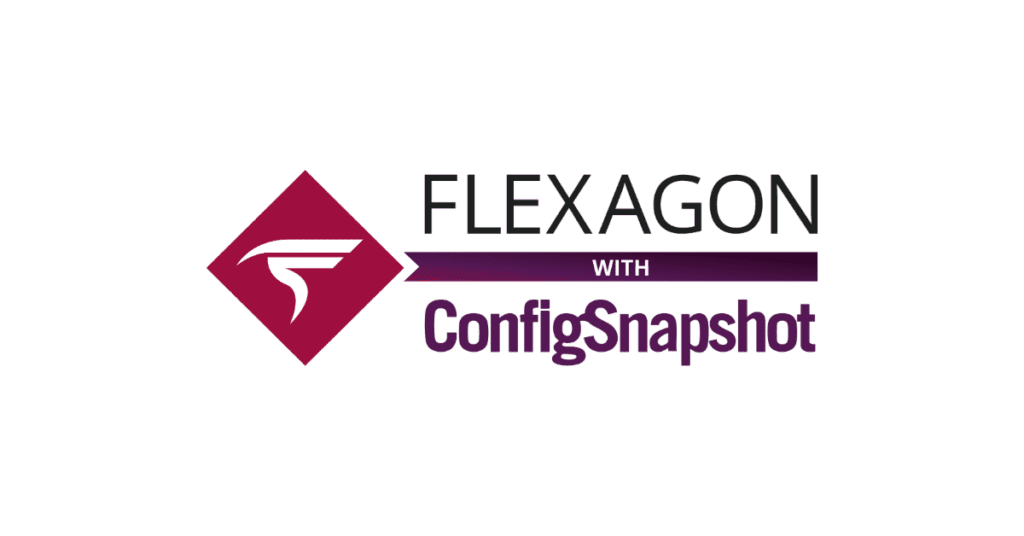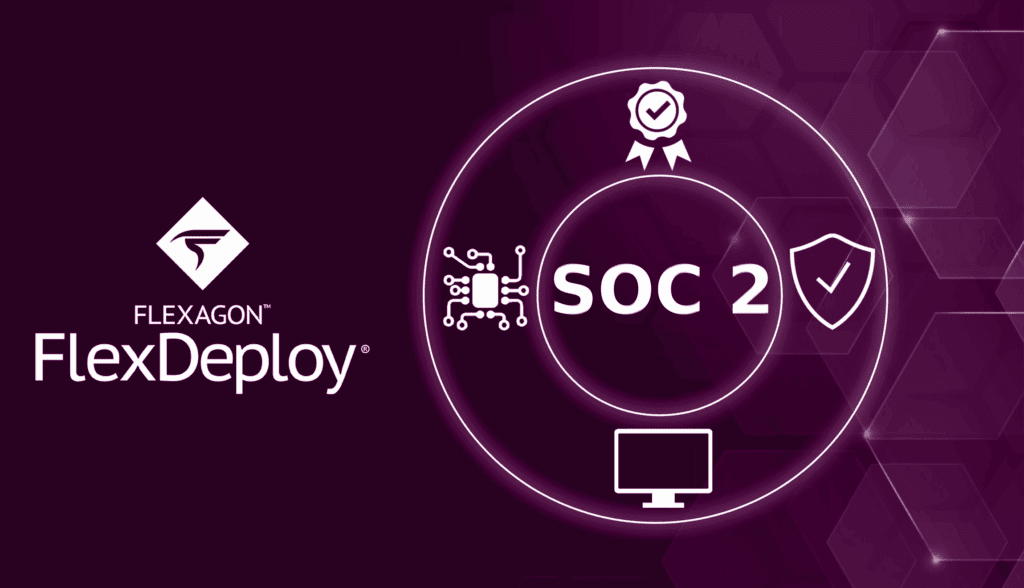FlexDeploy 5.0 Series Releases
FlexDeploy 5.0.0.1
Flexagon has released the first 5.0 Fixpack, 5.0.0.1, which includes many enhancements and new features in addition to bug fixes for FlexDeploy, a DevOps platform for continuous delivery and release automation. We are also working on our next major release of FlexDeploy, version 5.1, which is planned for general availability in 1Q 2019. In this article, I’ll share a glimpse into the content of the fixpack.
FlexDeploy 5.0.0.1 Fixpack Highlights
Oracle Cloud – Cloud in general is a big investment area for Flexagon and supports the enablement of multi-cloud strategies such as Amazon, Azure, Google, and Oracle. This fixpack extends the already robust support for Oracle Infrastructure and Platform services.
- Oracle Integration Cloud (OIC) – The first OIC plugin was delivered in 5.0, and it has been enhanced with 7 new plugin operations that provides end to end automation. For example, there are new operations added to manage connections and lookups. The focus is on simplicity and flexibility and includes the ability to automatically manage connections within the integration operations.
- Oracle Cloud Infrastructure (OCI) – Support for classic IaaS was already in place, and a new plugin is now available to manage Oracle’s strategic cloud infrastructure, OCI. Operations for the OCI plugin include Start, Stop and Restart of cloud instances.
Business Intelligence and Data Integration – Many customers are realizing the value of FlexDeploy’s support for Business Intelligence and Data Integration, including the plugins for OBIEE, ODI, and Informatica. This fixpack includes some changes/enhancements to the OBIEE plugin which simplifies and streamlines the overall deployment process.
- The operations for RPD and WebCatalog files are now separated in obiBuild, obiDeploy, rpdBuild, and rpdDeploy. The operation for restarting of services has also been separated.
- Added property to indicate source RPD password, which is useful if the password for RPD files is different across environments.
- Environment Instance and Project level properties are simplified now for easier configuration, for example, some properties are now derived automatically.
Oracle Fusion Middleware – Some of the most popular FlexDeploy plugins are related to Fusion Middleware products such as SOA, OSB, and WebLogic. The MFT and WebLogic plugins were further enhanced in this fixpack.
- The MFT plugin now includes support for MFT Credentials, and the Export Transfer now allows for export of all or common properties for the configuration plan.
- Oracle WebLogic Resource Management support has been improved, including data sources now including 2-phase commit configuration.
Containers support for Docker and Kubernetes – Containers are strategic for many reasons, and that’s why the Docker and Kubernetes plugins are available. Several enhancements to these plugins include:
- The Docker plugin operation, buildProjectImage, is now available and Builds a Docker image based on the FlexDeploy Project’s container configuration.
- Kubernetes support includes 2 new plugin operations for run and execute. The run operation creates a new deployment on a K8s cluster from a Docker image and the exec operation executes a custom command inside a pod on a K8s cluster.
Oracle Database and APEX – DevOps for databases has gotten a lot of attention lately! FlexDeploy includes powerful Oracle Database schema management features which makes the lives of DBA’s better, and a plugin for Oracle APEX to streamline the CI/CD process for APEX based development. In this fixpack, we continue to extend the support for both Oracle Database and for APEX.
- The Oracle Database compileInvalid operation can be quite helpful, and this operation has been improved to handle additional use cases for failure conditions.
- Oracle APEX enhancements to the deploy operation can now be used with partial deployment projects, which allows users to deploy one or more individual application pages if they are exported individually and stored in SCM. The APEX plugin was also enhanced to support the TNS_ADMIN environment variable which can be useful if .ora configuration files are not in standard location.
General Enhancements – We continue to invest in areas such as Usability, Performance, and general platform support. Here are a few examples included in this fixpack.
- Date format for the following Locales are added – Norway, Sweden, Chile.
- The Post Clone Request form has been updated for ease of use. This feature is useful specifically for Oracle EBS where non-production environments are frequently refreshed from production. The Post Clone Request makes it easy to redeploy code that was overwritten during clone process.
- Significant performance improvements for the export step for partial deployment projects using Git as their SCM.
- FlexDeploy now supports HP-UX Operating System for both FlexDeploy Server and Endpoints.
FlexDeploy 5.0.0.3
FlexDeploy 5.0.0.3 includes enhancements and bug fixes for FlexDeploy, our DevOps platform for continuous delivery and release automation. Here are some highlights!
Cloud – Cloud in general is a big investment area for Flexagon and supports the enablement of multi-cloud strategies such as Amazon, Azure, Google, and Oracle. This fixpack includes two new plugins for cloud platform services focused on API Management.
- Oracle API Platform – used for managing APIs, making it easy to export APIs from the development environment and import them into other environments. This reduces the potential for human error and allows the user to leverage FlexDeploy’s release orchestration features such as approvals, scheduling, automated testing and visibility via dashboards and reports.
- Google Apigee – used for deploying an Apigee API proxy or shared flow using the Maven Apigee deploy plugin. This makes it easy to manage the deployment across environments and reduces the potential for human error. Using the Apigee plugin also allows the user to leverage FlexDeploy’s release orchestration features such as approvals, scheduling, automated testing and visibility via dashboards and reports.
Oracle E-Business Suite – The FlexDeploy support for EBS is robust and we continue enhancing support for this popular ERP.
- For partial deployment projects, an enhancement is included to allow a deploy plugin operation to skip files from execution using object types. This is useful to perform deployment of specific object types on specific endpoints.
- A new FlexDeploy for E-Business Suite video is available which covers our support for Releases and Pipelines.
Business Intelligence and Data Integration – Many customers are realizing the value of FlexDeploy’s support for Business Intelligence and Data Integration, including the plugins for OBIEE, ODI, and Informatica. This fixpack includes some changes/enhancements to the ODI plugin which simplifies and streamlines the overall deployment process. More specifically, we added the ability to deploy scenarios under scenario folders and support for ODI 12c mappings.
Oracle Database and APEX – DevOps for databases has gotten a lot of attention lately! FlexDeploy includes powerful Oracle Database schema management features which makes the lives of DBA’s better, and a plugin for Oracle APEX to streamline the CI/CD process for APEX based development. In this fixpack, we continue to extend the support for APEX by allowing the setup of source environment for the deploy operation.
General Enhancements – We continue to invest in areas such as Usability, Performance, Tutorials, and general platform support. Here are a few examples included in this fixpack.
- REST API enhancements for Release Snapshots and Workflows – provides additional flexibility to drive FlexDeploy from external clients.
- As you might know, FlexDeploy Loves Containers. Docker images for FlexDeploy are delivered with all releases, so check them out here!
For more details, please review the release notes.
FlexDeploy 5.0.0.4
The new version includes enhancements and bug fixes for FlexDeploy, our DevOps platform for continuous delivery and release automation. A few highlights include
- a new Helm plugin which streamlines installing and managing Kubernetes applications
- ongoing improvements for REST APIs
- ODI support for deployment archives
Check out the new 5.0.0.4 release notes today!


